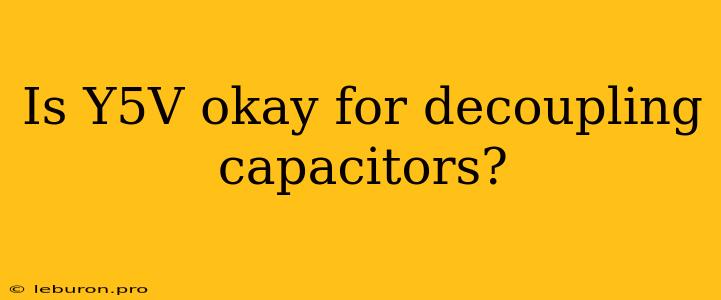Is Y5V Okay for Decoupling Capacitors? Understanding Capacitor Dielectrics and Their Applications
Choosing the right capacitor for a circuit is critical, especially when it comes to decoupling capacitors, which are essential for filtering out unwanted noise and providing stable power to sensitive electronic components. One common type of capacitor, often used in consumer electronics and other applications, is the Y5V capacitor. However, a question arises: is Y5V okay for decoupling capacitors? The answer, while not a simple yes or no, depends on understanding the characteristics of Y5V capacitors and their suitability for decoupling applications.
Decoupling capacitors are crucial for preventing voltage fluctuations and ensuring the smooth operation of sensitive components. These capacitors act as small reservoirs of charge, providing a quick and stable source of power to counteract rapid voltage changes. Choosing the right decoupling capacitor involves considering factors like capacitance, voltage rating, temperature coefficient, and, most importantly, the dielectric material.
Understanding Capacitor Dielectrics: The Heart of the Capacitor
Capacitors store energy by creating an electric field between two conductive plates separated by a dielectric material. This dielectric material is the key factor in determining the capacitor's properties, including its capacitance, voltage rating, and temperature coefficient.
Y5V capacitors are characterized by their use of a ceramic dielectric material with a high dielectric constant. This high dielectric constant allows for a higher capacitance value in a smaller package, making them attractive for cost-effective applications. However, this high dielectric constant also comes with a significant drawback: Y5V capacitors have a high temperature coefficient.
The Temperature Coefficient: A Crucial Factor
The temperature coefficient describes how a capacitor's capacitance changes with temperature. A high temperature coefficient means that the capacitance of the Y5V capacitor will vary significantly with temperature fluctuations. This can be problematic in sensitive electronic circuits, where stable voltage levels are crucial.
Why Y5V Might Not Be Ideal for Decoupling
While Y5V capacitors offer the advantage of high capacitance in a small package, their high temperature coefficient makes them unsuitable for applications requiring stable capacitance over a wide temperature range. This is where decoupling capacitors come into play.
Decoupling capacitors are often required to maintain a stable voltage supply even under varying loads and temperatures. Y5V capacitors, with their volatile capacitance behavior, can introduce instability into the power supply, potentially leading to malfunctioning components.
When Y5V Might Be Acceptable
Although generally not recommended for decoupling, there are situations where Y5V capacitors might be acceptable. For low-frequency applications or circuits with limited temperature variations, the impact of the high temperature coefficient might be negligible. However, it's crucial to carefully consider the application requirements and the potential impact of the temperature coefficient before making a decision.
Alternatives to Y5V for Decoupling Capacitors
If stable performance over a wide temperature range is a priority, alternatives to Y5V capacitors are recommended for decoupling applications. X7R and X5R capacitors, with their lower temperature coefficients, offer greater stability and are often preferred in decoupling circuits. These capacitors typically have lower capacitance values than Y5V counterparts but provide superior performance in terms of stability.
Choosing the Right Decoupling Capacitor
Selecting the right decoupling capacitor involves carefully considering the following factors:
- Capacitance: Determine the required capacitance value based on the application and the load being decoupled.
- Voltage rating: Ensure the capacitor's voltage rating exceeds the maximum voltage expected in the circuit.
- Temperature coefficient: Choose capacitors with low temperature coefficients for stable performance over a wide temperature range.
- Dielectric material: Consider the dielectric material's properties, including its temperature coefficient, voltage rating, and frequency response.
By carefully considering these factors and consulting relevant datasheets, engineers can select the optimal decoupling capacitor for their specific application, ensuring stable power supply and reliable circuit operation.
Conclusion: Y5V and Decoupling Applications
While Y5V capacitors offer cost-effectiveness and high capacitance in a small package, their high temperature coefficient generally makes them unsuitable for decoupling applications that require stable performance over a wide temperature range. For these applications, capacitors with low temperature coefficients, such as X7R and X5R, are often preferred. Understanding the characteristics of different capacitor types and their suitability for specific applications is crucial for designing reliable and efficient electronic circuits.
